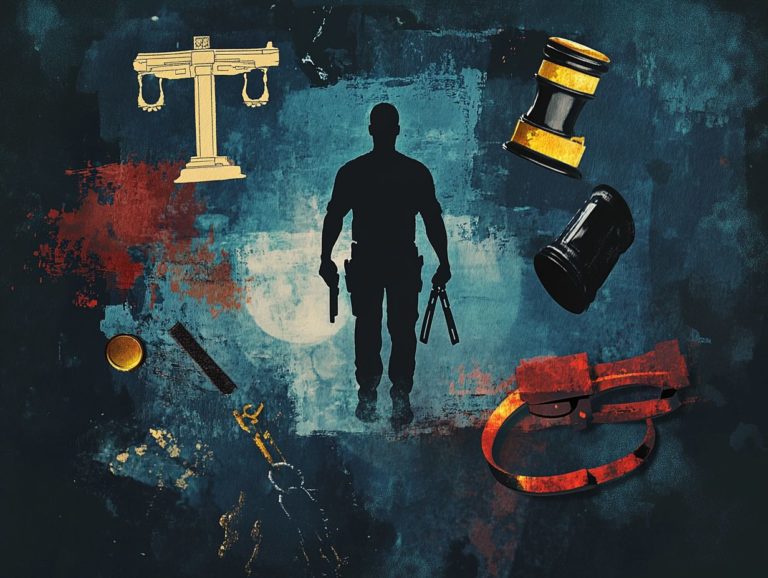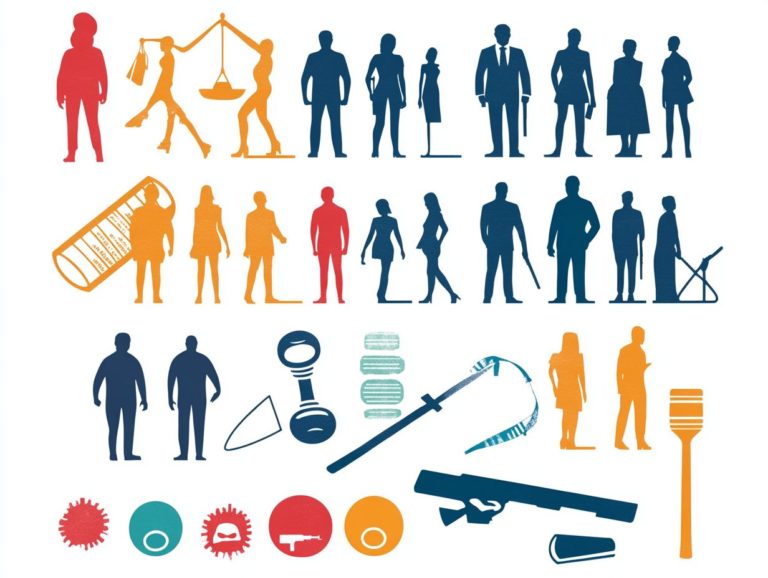5 Common Types of Drug Crimes
Drug-related offenses carry significant consequences, affecting not just the individuals involved but also the broader community. If you re facing these charges, it s crucial to know what s at stake!
This article delves into five common types of drug crimes: possession, trafficking, manufacturing, prescription drug fraud, and driving under the influence (DUI). It also addresses the legal consequences you might face and the vital role a criminal defense attorney can play in your case.
Understanding these complexities is essential for anyone looking to navigate the often daunting landscape of drug-related issues.
Contents
Key Takeaways:
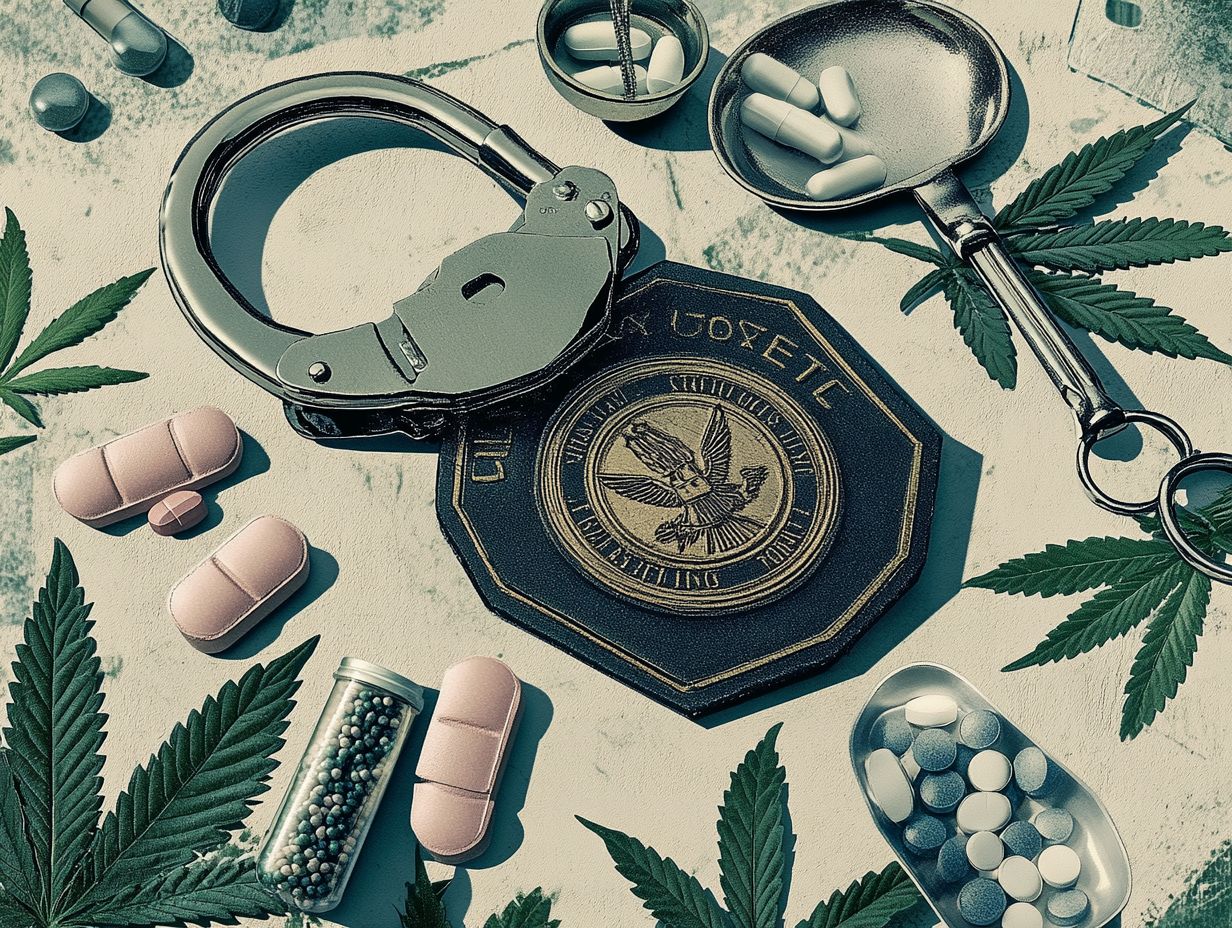
Possession, trafficking, manufacturing, prescription fraud, and DUI are common types of drug crimes. Consequences for these offenses vary based on the type and severity. A criminal defense attorney can help build a strong defense and potentially reduce the consequences of a drug conviction.
1. Possession of Illegal Drugs
Possessing illegal drugs, including substances like marijuana, is a serious matter under both California state law and federal law. The legal consequences can vary significantly, from misdemeanor charges to felony convictions, depending on the quantity and type of drug involved.
In San Diego, the legal landscape surrounding drug possession is complex, especially as attitudes towards cannabis evolve. If you re facing such charges, it s crucial to understand the potential penalties and the legal defenses available to you.
Possession generally means having control over a substance. Drugs are categorized based on their potential for misuse and medical value, with marijuana often viewed less harshly than methamphetamine or cocaine.
Penalties can differ dramatically; for instance, possessing a small amount of marijuana might only lead to a citation, while having harder drugs like heroin could result in felony charges leading to years in prison.
Recent studies in San Diego reveal that nearly 12,000 drug possession cases were filed in just one year, highlighting the significant impact on individuals lives. Understanding the difference between a misdemeanor (a less serious crime) and a felony (a more severe offense) goes beyond legality; it affects employment opportunities and personal freedom.
Therefore, it s imperative for those charged to seek knowledgeable legal advice.
2. Drug Trafficking
Drug trafficking involves illegal activities related to the distribution and transport of controlled substances like marijuana, cocaine, and fentanyl, which are governed by strict federal and California laws. This crime is prosecuted severely, reflecting the seriousness of the offense and the intent behind it.
If you’re facing accusations of drug trafficking, seeking experienced legal representation is crucial to navigate the complexities of your case.
The substances involved can vary widely in potency and method of consumption, significantly influencing the legal consequences. Trafficking in methamphetamine or heroin generally results in harsher penalties compared to marijuana, especially given California’s changing cannabis laws.
Offenders may face substantial prison time, hefty fines, or both, depending on whether the charges come from state or federal law. The accused’s intent matters; trafficking with the intent to distribute usually leads to more serious consequences than simple possession.
You can also use various defenses, such as entrapment or lack of knowledge, which can play a crucial role in potentially reducing charges and ensuring you receive a fair trial.
If you’re facing drug charges, don t wait. Contact a criminal defense attorney today for help!
3. Drug Manufacturing
Drug manufacturing refers to the unauthorized production of controlled substances, such as marijuana and methamphetamine. This can lead to severe penalties under both federal and California law often classified as felonies. The legal consequences are serious, potentially including lengthy prison sentences and substantial fines. If you find yourself facing drug manufacturing charges, consulting a skilled lawyer is crucial, as they can craft a robust defense strategy tailored to your situation.
Manufacturing involves a broad spectrum of activities related to creating various substances. This ranges from cultivating marijuana plants in regulated environments to intricate chemical processes used in synthesizing drugs like heroin and cocaine. Techniques may include everything from extracting active ingredients to synthesizing entirely new compounds, often requiring specialized knowledge and equipment.
While the legality of marijuana cultivation has evolved in various states, producing drugs like methamphetamine remains a serious offense that carries heavy penalties. Legal defenses might involve challenging the evidence against you, proving a lack of intent, or demonstrating compliance with legal standards in specific instances. Existing case law reveals the complexities of jurisdictional enforcement.
4. Prescription Drug Fraud
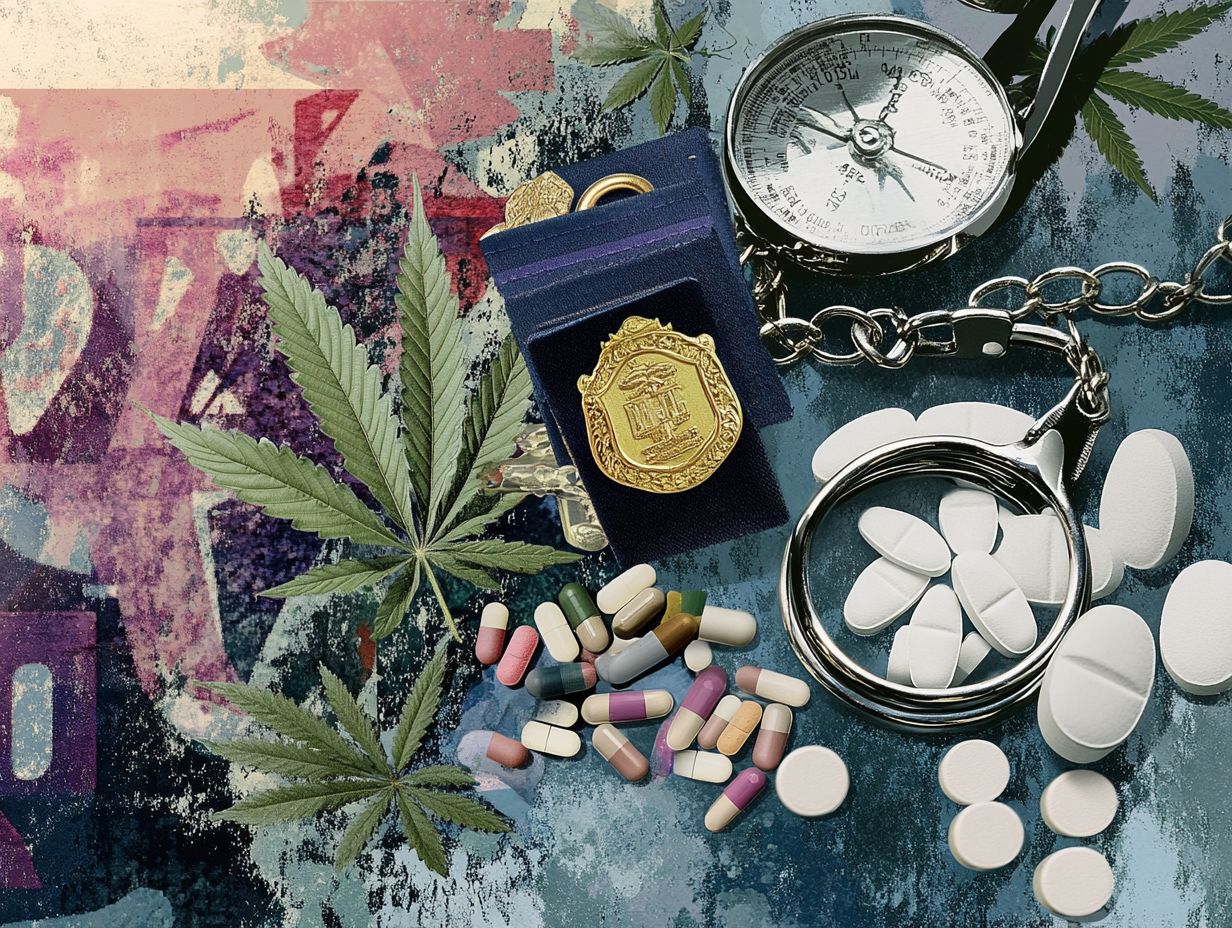
Prescription drug fraud is an escalating concern that involves the illegal obtaining, distribution, or use of prescription medications like OxyContin, Xanax, and Valium. Engaging in such activities can lead to serious criminal charges in San Diego and beyond. The stakes are high, with penalties that may include hefty fines and imprisonment.
If you are accused of prescription drug fraud, it s crucial to seek the expertise of a knowledgeable lawyer to guide you through your case.
The tactics employed in this type of fraud are varied and alarming. They may include forging prescriptions or participating in “doctor shopping,” where individuals visit multiple doctors to secure prescriptions for the same medications.
Statistics reveal that prescription drug abuse has become a significant public health crisis. This crisis contributes to overcrowded court systems and puts immense strain on healthcare resources. According to the National Institute on Drug Abuse, nearly 21 to 29 percent of patients prescribed opioids for chronic pain misuse them.
These staggering numbers highlight the urgent need for legal representation. If you’re facing charges, you risk not only jail time but also long-lasting effects on your personal and professional life. You must act quickly to get skilled legal help!
5. Driving Under the Influence of Drugs
Driving under the influence of drugs (DUID) is a serious matter in California. This includes not only illegal drugs but also prescription medications that could impair your ability to operate a vehicle safely.
The consequences can be quite severe, with potential penalties including hefty fines, license suspension, and even jail time in San Diego. It’s crucial to grasp the complexities of DUID, as the legal definitions and implications can differ significantly based on your specific situation.
DUID covers a wide range of substances that could lead to impairment. This includes common illegal drugs like marijuana, cocaine, and methamphetamines, as well as prescription medications such as opioids and sedatives that might affect your cognitive and motor skills.
If you are charged with DUID, expect the legal process to involve sobriety tests, toxicology reports, and possibly even court appearances. The penalties can be daunting, including substantial fines, mandatory drug education programs, and the possibility of a criminal record.
Such charges threaten your driving privileges and can wreak havoc on your insurance rates, potentially leading to skyrocketing premiums or difficulty securing coverage.
If you’re accused of DUID, consider exploring various defenses, such as challenging the legality of the traffic stop or the accuracy of field tests. This highlights the vital importance of having competent legal representation to navigate these serious consequences.
What Are the Penalties for Drug Crimes?
The penalties for drug crimes in San Diego, California, can vary greatly depending on the nature of the offense. Whether you re dealing with possession of drugs or facing more serious charges like trafficking and manufacturing, each comes with its own legal consequences.
These consequences can range from misdemeanors and felonies to fines and possible incarceration. Understanding the penalties associated with different drug-related offenses is crucial for navigating this complex legal landscape. Even minor infractions can have severe repercussions, impacting both your personal and professional life.
Drug offenses generally fall into categories, including:
- Possession
- Sales
- Distribution
You ll often find substances like marijuana, cocaine, and methamphetamine at the center of legal actions. For example, possession for personal use usually leads to lesser penalties compared to trafficking larger amounts. Your prior offenses and the amount of the drugs involved heavily influence sentencing; larger amounts lead to tougher penalties.
Recognizing these nuances highlights the importance of seeking experienced legal counsel. A knowledgeable attorney can effectively negotiate reduced penalties and guide you through the details of the law, ensuring the best possible outcome in a challenging situation.
What Are the Different Levels of Drug Offenses?
Drug offenses range from misdemeanors for minor marijuana possession to serious felonies tied to trafficking and manufacturing highly regulated drugs like cocaine and heroin. Each category carries its own penalties and legal consequences. Understanding these classifications is essential, as the level of your offense affects potential sentencing and your criminal record’s long-term implications.
Misdemeanor offenses typically involve smaller quantities of drugs, such as marijuana for personal use. These charges often come with lighter penalties, like fines or community service.
On the other hand, felony offenses usually pertain to larger quantities or more dangerous substances, leading to significant repercussions, including lengthy prison sentences. Factors such as prior offenses and intent matter greatly in these classifications.
For instance, possessing a small amount of methamphetamine could result in a felony charge because it s considered a more dangerous drug. This example illustrates how the legal system carefully considers both the type and amount of the drug, making it crucial for you to navigate these waters with awareness.
What Are the Defenses for Drug Crimes?
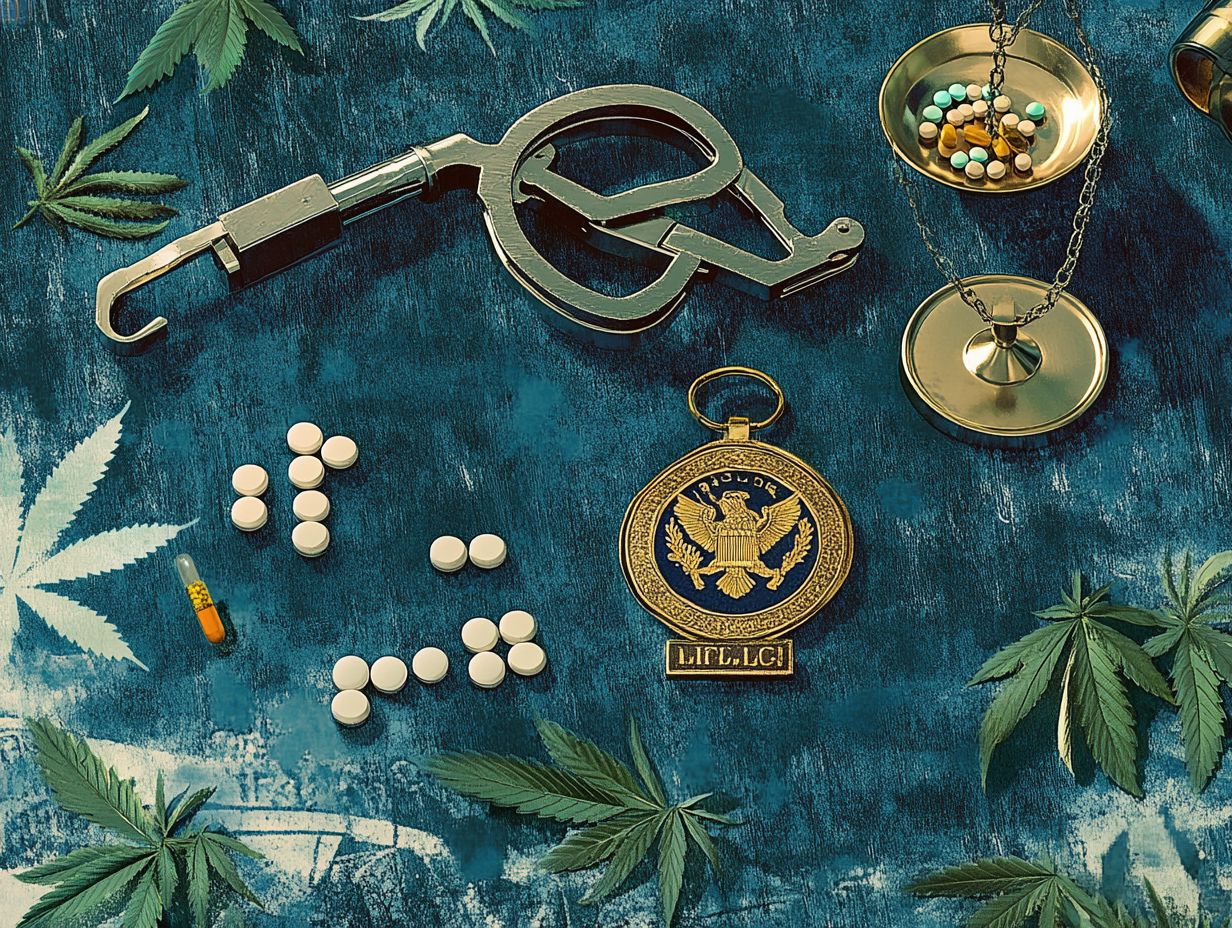
Defenses for drug crimes can vary significantly. You can challenge the legality of search and seizure procedures or argue that you had no knowledge of possessing drugs. You must hire a skilled lawyer in San Diego to protect your rights during this critical time!
When facing drug charges, consider strategies like constitutional challenges that examine whether your rights were violated during the investigation. The defense of entrapment is crucial in situations where law enforcement may have pressured someone into committing a crime they wouldn t have otherwise engaged in.
Misidentification is another viable defense, especially when witnesses or law enforcement make mistakes about your involvement in a drug-related offense.
Ultimately, having proficient legal representation cannot be overstated. It allows you to craft a robust defense tailored to the unique aspects of your situation. Don t wait reach out to an attorney today for a consultation!
How Can a Criminal Defense Attorney Help in Drug Crime Cases?
A criminal defense attorney who specializes in drug crimes can be your greatest ally in navigating the intricate landscape of the legal system. Their expertise in crafting a robust defense and negotiating plea deals is invaluable.
Understanding the potential consequences of drug-related charges in San Diego can significantly impact the outcome of your case. With their deep knowledge of local laws and legal processes, you can expect fair treatment under the law.
In these situations, the attorney’s role goes beyond just representing you in court; they become your trusted advisor throughout every step of the legal journey. When faced with charges, a seasoned defense attorney will evaluate the prosecution s evidence and pinpoint weaknesses or violations of rights that could strengthen your defense.
Their negotiation skills are also crucial when it comes to plea offers. An adept attorney might successfully secure reduced charges or a more lenient sentence for you. Strategies that challenge the legality of search warrants or demonstrate a lack of intent to distribute have led to favorable outcomes for many defendants.
In essence, the guidance of competent legal counsel can be the pivotal factor in achieving a more favorable result for you.
What Are the Possible Consequences of a Drug Conviction?
A drug conviction can ripple through your life in unexpected ways, impacting not just your legal status but also your future job prospects and educational goals. Understanding the consequences of a drug conviction is vital for your future.
You might face significant fines, lengthy probation, or even jail time, affecting both your personal and professional life. Employers often conduct background checks and may see a drug conviction as a major red flag, which can make landing a desirable job challenging.
Furthermore, educational institutions could deny you admission or scholarships, narrowing your career advancement opportunities. A drug conviction can also damage your relationships with family and friends, leading to feelings of isolation or stigma.
However, some individuals pursue expungement options or engage in rehabilitation programs, which can help mitigate these negative outcomes and facilitate a smoother reintegration into society.
How Can Drug Crime Charges Impact Employment and Education Opportunities?
Drug crime charges can profoundly affect your employment and educational opportunities. In places like San Diego, where drug-related offenses are treated seriously, background checks by employers and educational institutions often reveal any convictions or pending charges.
Understanding these implications is essential if you face drug charges, as the consequences can hinder your personal and professional growth for years. Fields such as healthcare, law enforcement, and education have strict policies against hiring individuals with drug convictions due to the inherent trust and responsibility of those roles.
On the other hand, industries like construction or hospitality may offer a more lenient approach, prioritizing skills and experience over past mistakes. Drug charges can also jeopardize your scholarship eligibility and admissions into academic programs, making it vital for students to navigate this terrain carefully.
When applying for jobs or schools, being open about these charges and emphasizing your commitment to personal growth or rehabilitation can help alleviate concerns and demonstrate accountability.
Frequently Asked Questions
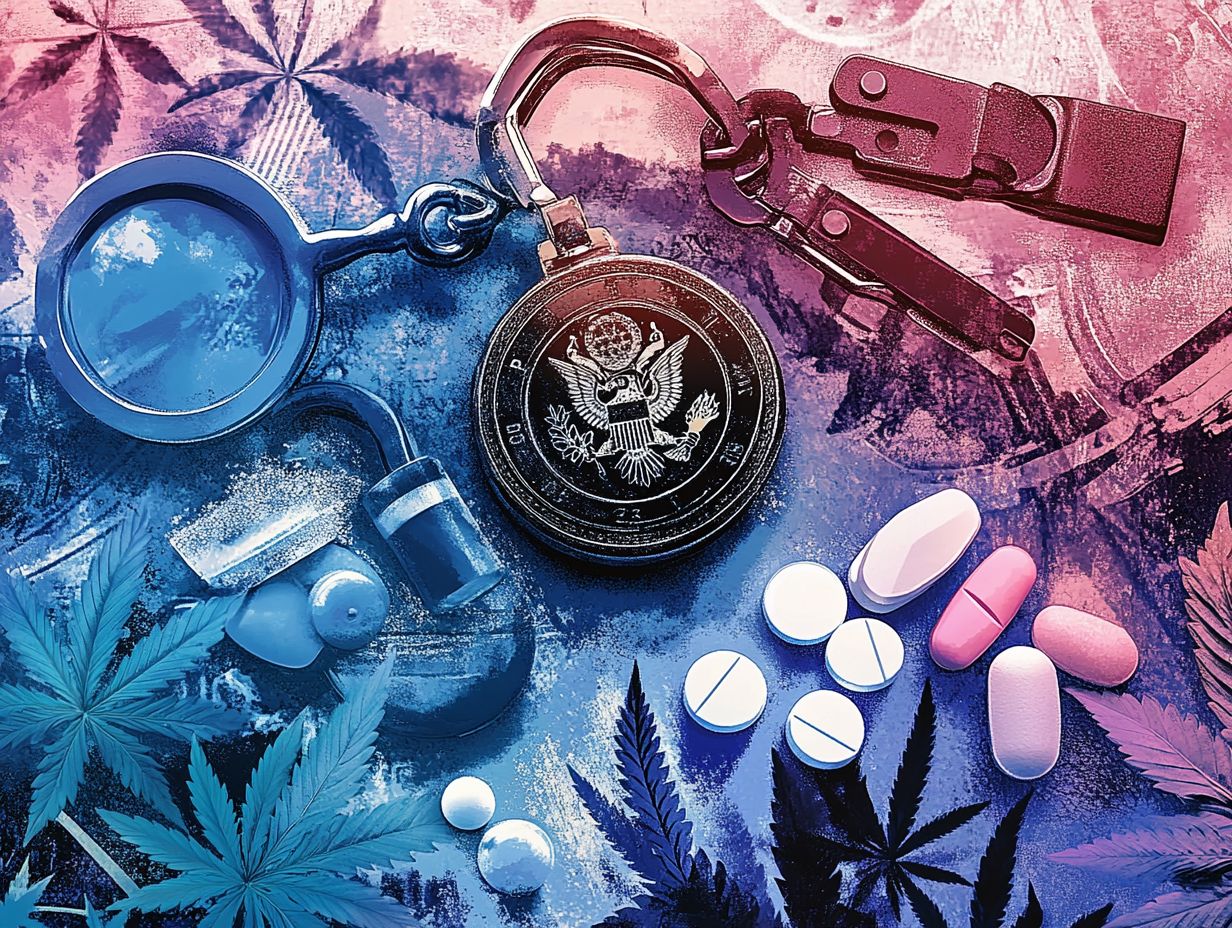
What are the top 5 drug crimes?
The top 5 drug crimes are possession, distribution, manufacturing, trafficking, and driving under the influence (DUI).
What is drug possession?
Drug possession is the act of having illegal drugs in your possession, either on your person or in your control.
What is drug distribution?
Drug distribution refers to the illegal sale, delivery, or transfer of drugs to another person. This includes selling drugs on the street.
What is drug manufacturing?
Drug manufacturing is the process of creating or producing illegal drugs, such as methamphetamine or ecstasy, using chemicals and equipment.
If you’re dealing with drug charges, don’t hesitate to reach out to a skilled attorney today!
What is Drug Trafficking?
Drug trafficking means moving, sharing, and selling illegal drugs across borders.
What Are the Consequences of a Drug-Related DUI?
A drug-related DUI can lead to serious consequences such as fines, jail time, and losing your license.
It can also increase your insurance rates and make it hard to get a job or find housing in the future.


